BBC Bans Gaza Appeal: On Saturday 24th January 2009 marchers gathered outside the BBC in Portland Place to draw attention to the biased reporting of the Israeli attack which had begun on 27 December 2008 and had ended with a ceasefire by Israel on 18th January.
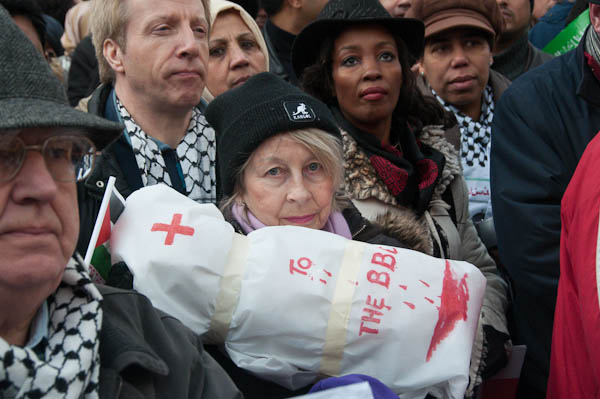
The attack, known by Israel as Operation Cast Lead but in Arabic as the Gaza Massacre had killed around 1300 Palestinians and 13 Israelis and had destroyed over 46,000 homes in Israel. It had begun with air attacks but was followed on January 3rd by a ground attack.
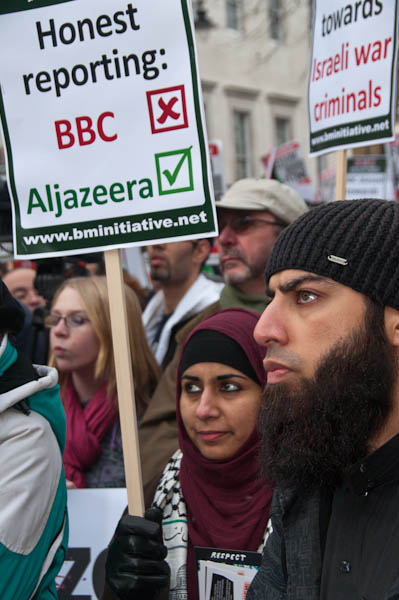
The protest called for for an end to the Israeli blockade of Gaze and for the UK to stop its arms sales to Israel, and for a free Palestine and demanded Israli war criminals to be brought to justice. It also castigated the BBC which although claiming to be impartial had accepted and broadcast much Israeli propaganda during the war while not giving a proper hearing to the views and aspirations of the Palestinians.
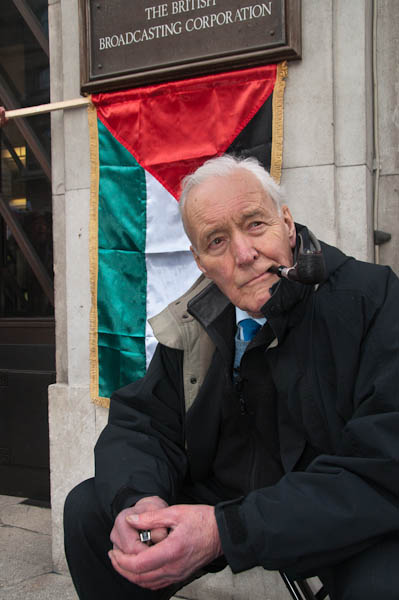
After the war, the United Nations Fact Finding Mission and human rights organisations criticised Israel for the large number of civilian casualties and having a deliberate policy of disproportionate force aimed at the civilian population. Among the war crimes that they found evidence for was the use of children and other civilians as ‘human shields’ forcing them “blindfolded, handcuffed and at gunpoint to enter houses ahead of Israeli soldiers during military operations.”
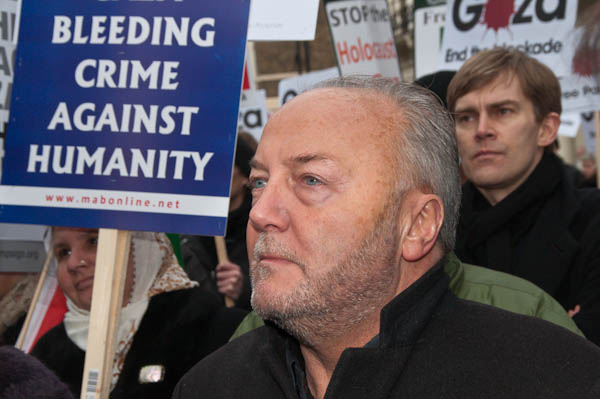
International media were denied access to the war zone by Israel in defiance of a ruling by the Israeli Supreme Court and many details only emerged later and the media in Gaza itself came under military attack. The Israeli foreign minister “instructed senior ministry officials to open an aggressive and diplomatic international public relations campaign to gain support for Israel Defense Forces operations in the Gaza Strip” and the BBC was among those news organisations who lapped up their offerings.
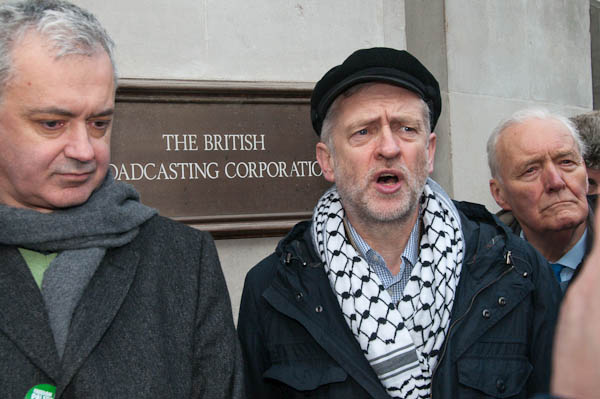
As the ceasefire was announced, humanitarian organisations around the world launched campaigns to bring much-needed humanitarian aid to Gaza. In the UK, the the Disasters Emergency Committee (DEC) which includes Oxfam, Save the Children and the Red Cross launched a nation-wide appeal, but the BBC (and Sky) refused to broadcast it although it went out on ITV, Channel 4 and Channel Five.
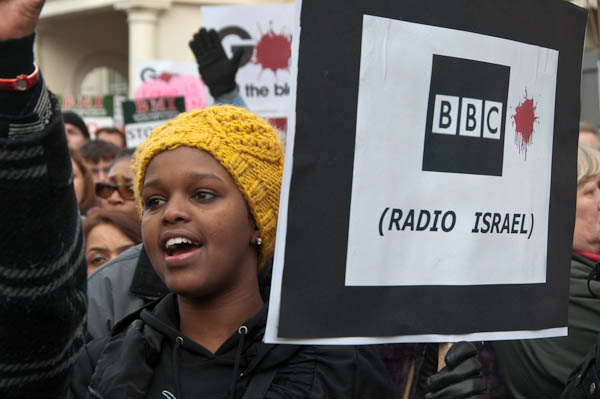
It was a decision which clearly made the BBC management’s pro-Israel position crystal clear to the nation and was widely seen, including by many BBC journalists as a failure by the BBC to uphold its reputation for impartiality.
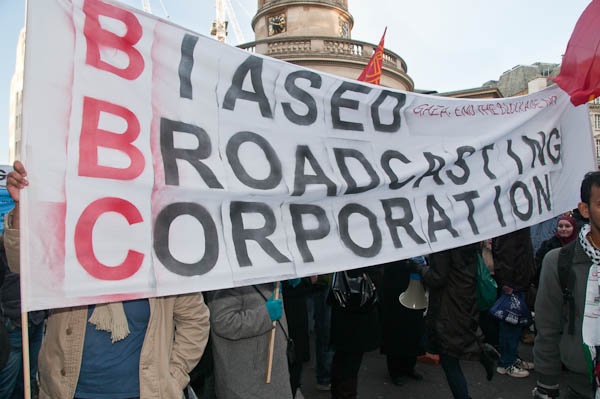
Which is perhaps why Tony Benn was invited onto the Today programme that morning to talk about the decision – and he came on and read the appeal for them. At the start of the protest I photographed him before and after he went in with a deputation to deliver a letter of protest to the BBC – police stopped me going in with him. Among those who also spoke outside the BBC was Jeremy Corbyn.
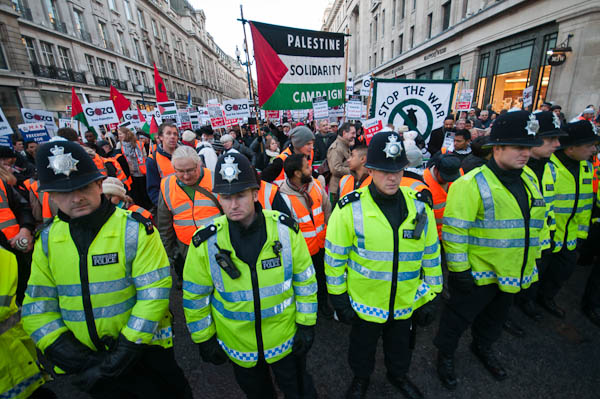
Pro-Israel press bias continued with the Press Association, who reported this press conference as the protest, giving the number present as 400. Even the police gave a figure of 5,000 – as usual roughly half of the actual number.
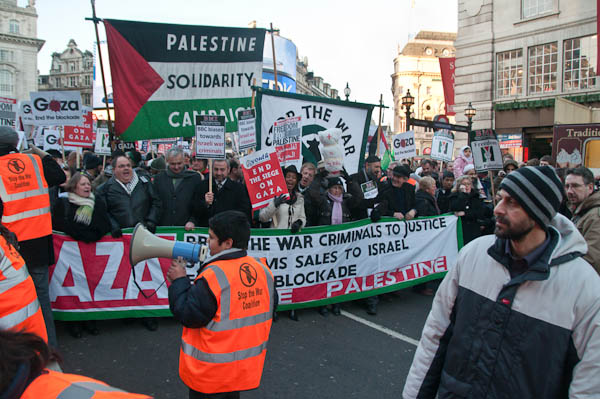
The protest was largely peaceful, though some had brought shoes to throw at Broadcasting House, but policing outside there was rather heavy-handed. When police made a few arrests when the march approached Piccadilly Circus the march halted and threatened to stay blocking traffic until the arrests stopped. They did and the march moved on to its final rally in Trafalgar Square.
More on My London Diary at Gaza: Protest March from the BBC.
Flickr – Facebook – My London Diary – Hull Photos – Lea Valley – Paris
London’s Industrial Heritage – London Photos
All photographs on this page are copyright © Peter Marshall.
Contact me to buy prints or licence to reproduce.